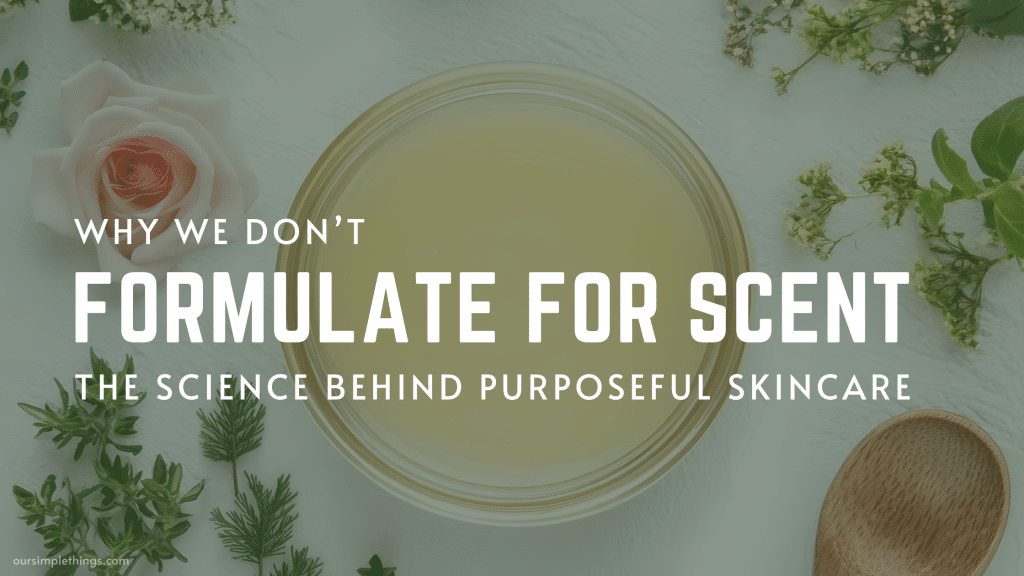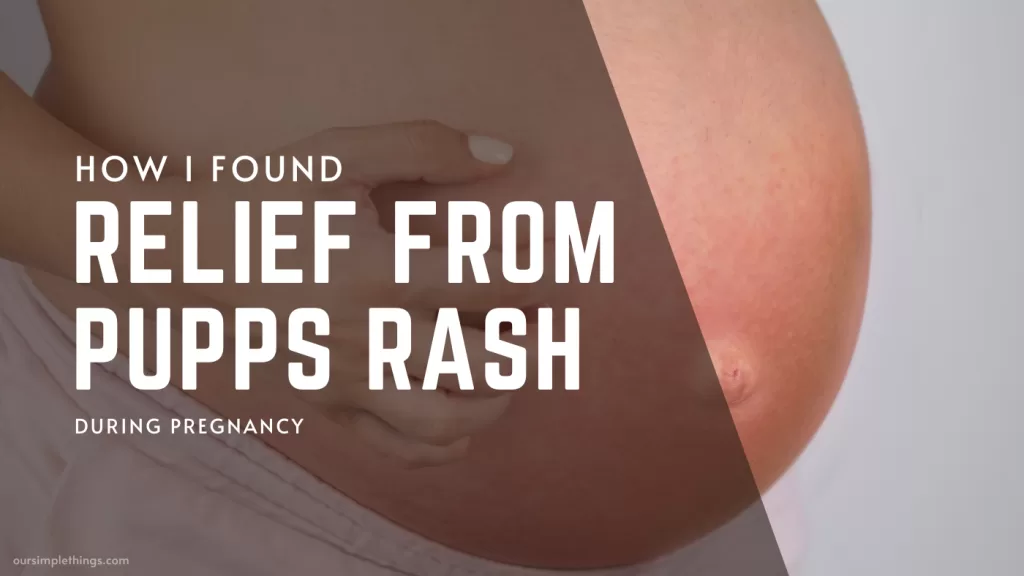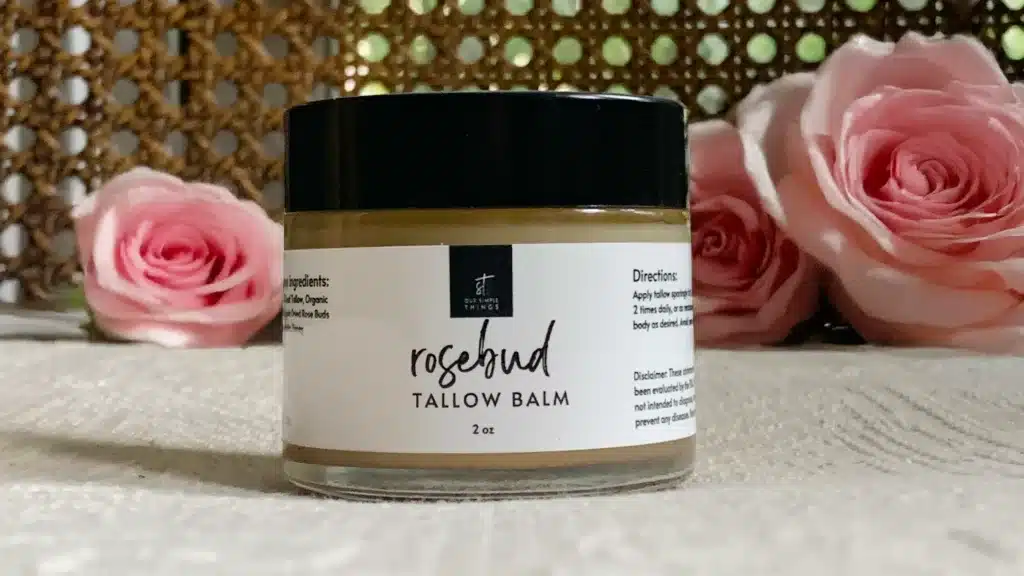When people stop by our booth at markets, the first thing they often do is open a balm and take a deep breath. Some are surprised when the scent is subtle. “Oh, this one doesn’t have much of a smell!” they say. But for us, that’s not a flaw. That’s the point.
In a world obsessed with how things smell, we’ve forgotten to ask what those smells might be doing to us.
At Our Simple Things, we don’t formulate for scent. We formulate for purpose. And there’s a mountain of science behind that decision.
The Scent Obsession: Why We’re Wired to Notice Smell
Scent plays a powerful role in memory and mood. That’s why many products are marketed around how they make you feel rather than what they do.
But over time, this has led to a sensory overload. The candles, plugins, wax melts, hair products, lotions, deodorants, soaps, laundry detergents, and air fresheners in a typical home can create a near-constant cloud of volatile chemicals. So much so that many people become desensitized to scent, needing stronger and stronger inputs to get the same emotional feedback.
This isn’t just anecdotal. Research shows that overexposure to synthetic and even natural fragrances can dull our olfactory receptors and lead to sensory fatigue.
“Fragrance overexposure is a growing concern not only for those with sensitivities, but for the population at large.” — Steinemann, 2016, Air Quality, Atmosphere & Health
Hormone Disruption and Respiratory Burden
Fragrance is often treated as a single ingredient, but it’s actually a proprietary blend of dozens (or hundreds) of compounds. Many of these include phthalates, parabens, and other hormone-disrupting chemicals.
Even essential oils, though naturally derived, can impact the endocrine system with prolonged use.
- A well-known study from the New England Journal of Medicine linked repeated topical use of lavender and tea tree oil to prepubertal gynecomastia in boys due to their estrogenic and antiandrogenic activity.
- The European Commission has flagged dozens of fragrance allergens that can cause immune responses and hormone dysregulation.
- Even natural terpenes in citrus oils and other plant materials can become phototoxic or cause sensitization over time.
These compounds also bypass the skin barrier and enter the bloodstream. Studies show that certain fragrance ingredients are measurable in urine within hours of application.
The Lung & Detox Burden
Our lungs, liver, and kidneys are the main filters of the body. When we breathe in volatile organic compounds (VOCs), whether from synthetic fragrances or strong natural oils, we add to the detox burden these organs carry.
A 2001 study by Loden & Andersson examined how even emulsifiers like PEGs (common in fragrance blends) increase skin permeability, letting more of these compounds into the bloodstream.
For sensitive populations, including children, pregnant women, and those with chronic illness, this can have compounding effects.
Essential Oils: Not as Gentle as You Think
We have a full blog post on why we don’t use essential oils right here.
In short:
- They are highly concentrated
- They can trigger migraines, skin irritation, or hormone issues
- They may damage the skin barrier in frequent use
While beautiful in concept, their potency means they are often overused in modern skincare.
The Desensitization Loop
Have you ever met someone who wears so much perfume that you can smell them from across the room?
That’s not just personal preference—it’s often the result of olfactory desensitization. When your body becomes accustomed to constant strong smells, your nose stops registering them. So people increase the amount, unknowingly contributing to an ever-rising toxic load.
This isn’t just a problem for the person using the product. It affects everyone they touch, live with, and share air with.
What We Choose Instead
At Our Simple Things, we formulate for skin results, not for shelf appeal.
If something smells a little like herbs, resin, or butter, that’s because it is. We use:
- Raw resins and slow-infused botanicals
- Whole plant powders and gentle oils
- Zero added fragrance
- Zero essential oils
Some of our products have more scent than others (like Wildwood or Hearth), but that’s just from the natural steeping process.
We Don’t Want to Be Smelled Before We’re Felt
Our goal isn’t to leave behind a scent trail. It’s to leave behind calmer skin, less flare-ups, and more healing.
We believe skincare should support the whole body—not overwhelm it. That means honoring not just your skin barrier, but your hormones, your lungs, your children, and even your peace of mind.
So if something doesn’t have a strong smell?
It might just be a sign that it’s safe enough to trust.
Resources and More to Explore
- Steinemann A. Fragranced consumer products: exposures and effects from emissions. Air Quality, Atmosphere & Health. 2016. https://link.springer.com/article/10.1007/s11869-016-0442-z
- Henley DV, Lipson N, Korach KS, Bloch CA. Prepubertal gynecomastia linked to lavender and tea tree oils. New England Journal of Medicine. 2007. https://www.nejm.org/doi/full/10.1056/NEJMoa064725
- Loden M, Andersson AC. Effect of polyethylene glycol on human skin. Acta Derm Venereol. 2001. https://pubmed.ncbi.nlm.nih.gov/11266191/
- Lundov MD, Johansen JD, Zachariae C, et al. Fragrance allergy: a clinical review. Contact Dermatitis. 2010.
- Kimber I, Basketter DA, Gerberick GF, Dearman RJ. Allergenicity of phenoxyethanol. Contact Dermatitis. 2008.
- Hostýnek JJ, Maibach HI. Skin irritation potential of fragrance ingredients. Contact Dermatitis. 2004.
- Campaign for Safe Cosmetics. Fragrance. https://www.safecosmetics.org/chemicals/fragrance/
- NRDC. Chemicals to Avoid When You’re Pregnant or Breastfeeding. https://www.nrdc.org/stories/chemicals-avoid-when-youre-pregnant-or-breastfeeding
- FDA. Phthalates in Cosmetics. https://www.fda.gov/cosmetics/cosmetic-ingredients/phthalates-cosmetics
- Women’s Voices for the Earth. What’s That Smell – Toxic Chemicals in Fragranced Cleaning Products. https://womensvoices.org/fragrance-ingredients/whats-that-smell/whats-that-smell-fact-sheet/
- ScienceDirect. Levels of synthetic musk fragrances in human milk from three cities. https://www.sciencedirect.com/science/article/abs/pii/S1001074210605062
- ScienceDirect. Chemical contaminants in breast milk: a brief critical overview. https://www.sciencedirect.com/science/article/pii/S2667009722000112
- ScienceDirect. Phthalate metabolites in breast milk from mothers in Southern China. https://www.sciencedirect.com/science/article/abs/pii/S0304389423021799
- Wikipedia. Galaxolide. https://en.wikipedia.org/wiki/Galaxolide
- Wikipedia. Nonylphenol. https://en.wikipedia.org/wiki/Nonylphenol
- Wikipedia. Endocrine disruptor. https://en.wikipedia.org/wiki/Endocrine_disruptor
- Wikipedia. Perfume intolerance. https://en.wikipedia.org/wiki/Perfume_intolerance



